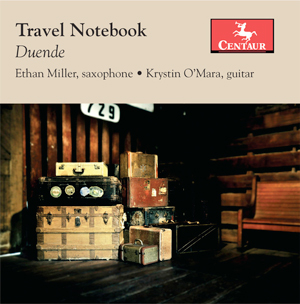by Jeremy Reynolds

Just over an hour in length, Travel Notebook includes arrangements of music by Heitor Villa-Lobos, Manuel de Falla, Astor Piazzolla, Agustín Barrios Mangoré, and Pedro Iturralde, and a commissioned work by James Wilding.
O’Mara sets up a rock-solid groove in the opening track of Iturralde’s Suite Hellénique. Miller weaves his sound around his partner’s ostinatos with a delightful sensuality. Duende handles the other four movements with aplomb. Miller’s technique is in full evidence and his smoky sound calls to mind a balmy Mediterranean evening.
The pair gives James Wilding’s Three Cities, Three Streets a spirited performance. Composed specifically for Duende and based on three photographs taken by the composer, the work begins with “Prague,” a slow, dreamy introduction to “Barcelona” and “Palermo,” two livelier, more virtuosic movements that showcase the Duo’s ensemble — not always perfectly tight, but consistently riveting.
Three stand-alone pieces — Villa-Lobos’s Bachianas Brasilieras No. 5, Barrios’ Julia Florida, and de Falla’s “Nana” from Siete Canciones Populares Españolas — an aria, a love song, and a lullaby — are quite lovely and fit nicely among the larger works. “Nana” is particularly effective, Miller’s lower register melody humming gently against a slow, gentle pattern in the guitar.
Travel Notebook concludes with Piazzolla’s Histoire du Tango, a work originally composed for flute and guitar, and since adapted for many different instrumental combinations. Saxophone and guitar make an excellent pairing for this work, though I hear Piazzolla’s “Bordel 1900” with a bit more flair and rhythmic precision than Duende supplies. On the other hand their sound perfectly compliments “Café 1930’s” nostalgia. “Night-Club 1960” and “Concert d’aujourd’hui,” like “Bordel,” could have used more Argentine character. The muggy voluptuousness of Piazzolla’s Oblivion winds down this debut recording quite nicely.
Published on ClevelandClassical.com June 17, 2017.
Click here for a printable copy of this article


